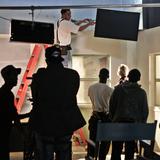- The Art Institute of California ? Los Angeles is a leader in providing degree programs in media, design, and culinary arts. Our faculty inspire vision and cultivate our students' creative and intellectual imagination through a learner-centered approach to instruction. We promote a culture of student responsibility through practical training by challenging students to engage course content, problem-solve and think inventively. We provide support services that enable our students to professionally compete in their desired field. We create value for students by providing state of the industry skills, techniques and technological resources. We are committed to helping our students achieve their artistic, educational and career goals.
School Highlights
The Art Institute of California-Argosy University Los Angeles served 1,436 students (73% of students were full-time).
The college's student-teacher ratio of 26:1 was lower than the state community college average of 32:1.
Minority enrollment was 94% of the student body (majority Hispanic), which was more than the state average of 77%.
School Overview
The Art Institute of California-Argosy University Los Angeles
(CA) Community College Avg.
Carnegie Classification
Associates Colleges
Baccalaureate/Associate's Colleges: Associate's Dominant
Institution Level
Less than 2 yrs
At least 2 but less than 4 years
Institution Control
Private, for profit
Public
Year Founded
1997
Total Faculty
56 staff
315 staff
Student Body
Total Enrollment
1,436 students
9,796 students
Student-Teacher Ratio
26:1
32:1
# Full-Time Students
1,051 students
1,259 students
# Part-Time Students
385 students
8,537 students
# Enrollment Undergraduate
176 students
242 students
# Full-Time Undergraduate Students
1,051 students
1,250 students
# Full-Time Graduate Students
n/a
63 students
# Part-Time Undergraduate Students
n/a
8,299 students
# Part-Time Graduate Students
n/a
10 students
Total Dormitory Capacity
n/a
121 students
% American Indian/Alaskan
1%
n/a
% Asian
2%
13%
% Hispanic
43%
47%
% Black
5%
7%
% White
6%
23%
% Hawaiian
n/a
1%
% Two or more races
1%
5%
% Non Resident races
n/a
1%
% Unknown races
42%
3%
Diversity Score
0.63
0.70
College Completion Rate (Students who graduate in less than 4 years)
n/a
42%
College Completion Rate (Students who graduate in 4 years or more than 4 years)
n/a
43%
Average Graduate Earnings (10 Years)
$41,300
$34,700
Tuition and Acceptance Rate
Private State Tuition Fees
$18,748
$17,819
% Students Receiving Some Financial Aid
94%
77%
Median Debt for Graduates
$24,750
$9,500
Median Debt for Dropouts
$7,846
$5,500
Acceptance Rate
44%
86%
Source: 2016 (or latest year available) Integrated Postsecondary Education Data System (IPEDS)
School Notes
- The Art Institute of California ? Los Angeles is an educational institution for career preparation in the visual and culinary arts. The Art Institute of California ? Los Angeles is a member of The Art Institutes system. The Art Institute of California ? Los Angeles offers degree programs in Associate of Science degrees in Culinary Arts, Graphic Design, Interactive Media Design, and Video Production; and Bachelor of Science degrees in Culinary Management, Game Art & Design, Graphic Design, Interior Design, Media Arts & Animation, and Interactive Media Design. The Art Institute of California ? Los Angeles prepares students for entry-level positions in creative, challenging careers. Each program is offered on a year-round basis, allowing students to continue to work uninterrupted toward their degrees. An impressive faculty of working professionals strives to strengthen students' skills and to cultivate their talents through well-designed curricula. In 1997, The Art Institute of California ? Los Angeles opened its location on 31st Street in the city of Santa Monica in 1997. The Art Institute of California ? Los Angeles occupies approximately 107,000 square feet. In addition to classrooms, studios, laboratories, offices, a student lounge, a library, and an exhibition gallery, The Art Institute maintains an art supply store for the convenience of students. The year-round average class size for The Art Institute of California ? Los Angeles is 22 or fewer students. Class size, however, will not exceed 35 students in lab sessions or 40 students in lecture sessions. Equipment provided at The Art Institute of California ? Los Angeles is specific to the program of study. This includes, but is not limited to, projectors, editing decks, PC and Macintosh computers, printers, and fully-equipped kitchens. The Art Institute of California ? Los Angeles has received approval to operate from the Bureau for Private Postsecondary and Vocational Education for Bachelor of Science degree programs, Associate of Science degree programs and Diploma programs The Art Institute of California ? Los Angeles is accredited by the Accrediting Council for Independent Colleges and Schools (ACICS).
Frequently Asked Questions
How much does The Art Institute of California-Argosy University Los Angeles cost?
The Art Institute of California-Argosy University Los Angeles's private state tuition is approximately $18,748.
What is the acceptance rate of The Art Institute of California-Argosy University Los Angeles?
The acceptance rate of The Art Institute of California-Argosy University Los Angeles is 44%, which is lower than the state average of 86%.
Recent Articles

Giving Back: How to Choose the Right Community College for Nursing, IT, or Business in 2026
Practical guidance for selecting the best community college for Nursing, IT, or Business in 2026, with expert tips on fit, outcomes, and career alignment.

How Community College Students Can Build a Transfer-Ready Portfolio for 2026
Learn how community college students can build a transfer-ready portfolio for 2026 admissions with coursework, projects, recommendations, and planning tips.

Community Colleges on the President’s Honor Roll for Service
How community colleges earn the President’s Honor Roll for Community Service, with 2026 examples, impact data, and student opportunities.






